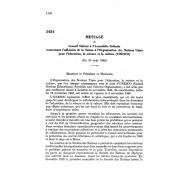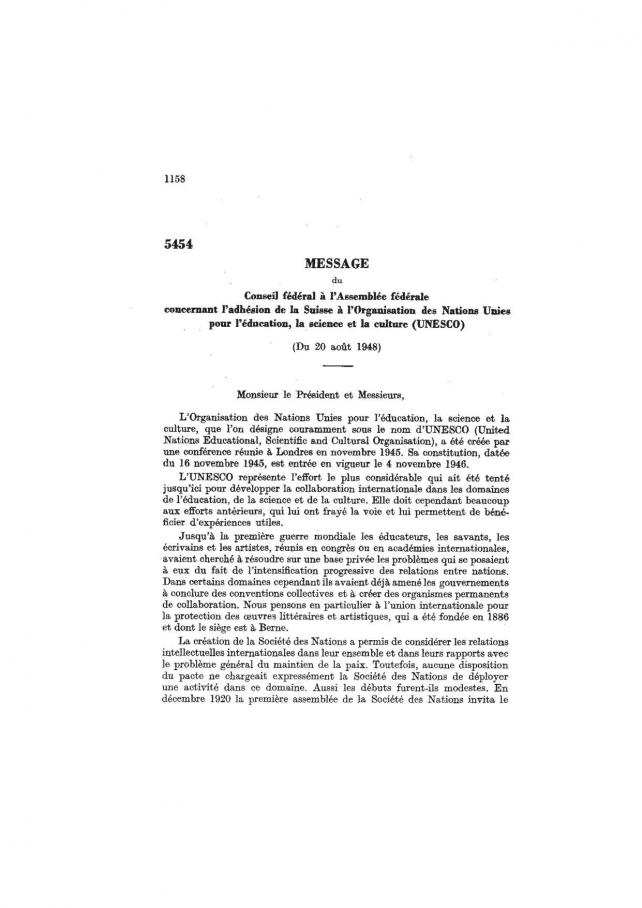Switzerland and UNESCO - a culture of peace
“Since wars begin in the minds of men, it is in the minds of men that the defences of peace must be constructed". These words, chosen as the preamble to the Constitution of UNESCO – the UN agency for education, science and culture – in 1946, are a programme in itself. The new organisation raised high hopes. At the end of the Second World War one aspired to create a new world, in which culture would serve to promote international peace.
Although Switzerland was not yet a member of the UN (it joined in 2002), the UNESCO very soon caught its attention. For a small country trying to come out of the comparative isolation it found itself in after the war, it was an occasion not to miss. In a message of August 20, 1948, the Federal Council noted that “[...] our country would isolate itself politically and intellectually if it refused to collaborate with an international organisation, whose aims are so clearly aligned with those which it aspires to reach itself on a national scale as well as in its relations with other countries.”
Jean-Rodolphe de Salis, future president of Pro Helvetia and then professor at the Federal Institute of Technology in Zurich, filed the application for membership at the first General Conference of the UNESCO, which took place in Paris from November 10 to 20 December 1946. The Swiss Confederation became a formal member of the organisation in 1949.
Many Swiss personalities would be brought in to collaborate with the UNESCO. Several of them also served as members of the Executive Board: pedagogue Jean Piaget from 1950 to 1954; diplomat and writer Bernard Barbey from 1964 to 1970; philosopher Jeanne Hersch from 1970 to 1972, and the former General Secretary of the National Commission for UNESCO and future ambassador Charles Hummel from 1976 to 1980.
To safeguard the link between the international organisation and the Swiss communities active in the fields of education, science, and culture, the National commission for UNESCO was founded, still working today. Since its origins in 1949 its composition has undergone many changes, but there have always been an important proportion of representatives of civil society in its overall make up.
For a country presenting itself as a champion in the field of education with experts such as Pestalozzi or Piaget, UNESCO was a platform not to miss. Some voices even maintained that Switzerland’s membership was motivated by altruism and had been a charitable act, as a journalist of the Journal de Genève claimed in 1951: “Switzerland, which has more to offer than to receive, acquired an important position and began to play a role only three years after having joined UNESCO. For Switzerland it was a typical act of international solidarity”.
Max Petitpierre, in charge of Foreign Affairs, even came to acknowledge that participation in UNESCO was an opportunity for the country to “promote its values” to the rest of the world, to intellectuals and scientists, and above all a chance to be integrated into the international community of scholars. Collaborating with the new agency, an essential tool for building international relations after the war was in the best interest of the Confederation.
Working with UNESCO allowed Switzerland into the UN scene and to be part of international technical cooperation and the North-South dialogue, which gained more and more importance. Very soon, the National Commission was prompted to provide Swiss experts for aid missions all over the world.
It was a sure way of promoting peace and intercultural dialogue, but also a means to promote the image of a cooperative, technologically advanced and rich Switzerland.
(pm)
Sources:
Message du Conseil fédéral à l'Assemblée fédérale concernant l'adhésion de la Suisse à l'Organisation des Nations Unies pour l'éducation, la science et la culture, 20 août 1948.
Réponse de Max Petitpierre à l’interpellation Boerlin, 14.106.51, www.dodis.ch/8741
Archives fédérales, fonds du Département politique : E2001(e), E2003(a), secrétariat de la CNSU : E900.1
Chloé Maurel, L’UNESCO. Les trente premières années, 1945-1974, Paris, L’Harmattan, 2010.












